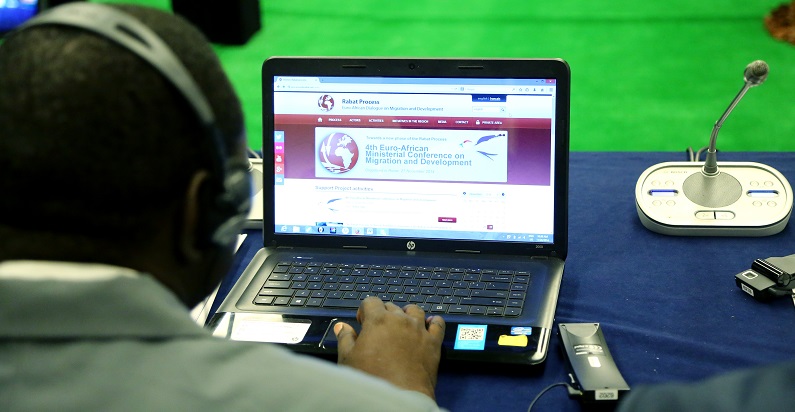-
29 December 2014
Category : Interview
Common sense in the service of a better migration policy
Por Maxence Defontaine, compañero de la FIIAPP dentro del proyecto de migración 'El Proceso de Rabat'. By Maxence Defontaine, colleague of the FIIAPP within the migration project 'The Rabat Process'. Article previously published in the 3500 Millones blog(El País).

Lucid and balanced, two terms that should be considered essential when it comes to developing adequate migration policies. Lucid, because it’s necessary to observe the reality of migration as it is: a phenomenon originally initiated by the person but which currently, as a result of unsustainable socio-economic inequality, has become a reality forced upon many. And balanced because migration, being a complex reality, requires global and cross-cutting responses that take into account both the situation of the migrants and that of the countries of origin, transit and destination.
These ideas coincide with the principles that gave rise to the Rabat Process, Euro-African Dialogue on Migration and Development, begun in Morocco in 2006 to address issues related to Euro-African migration and, more specifically, with the West African migration route, by adopting a flexible approach and a spirit of shared responsibility.
Why talk about the Rabat Process here?
It’s clear that the problems and challenges of migration require coordinated political responses, and to be viable and realistic they must integrate the needs and interests of the main stakeholders. The Rabat Process in recent years has demonstrated its mutable and evolving nature in which the priorities are defined following exchange and discussion between the countries, international organizations and civil society. In turn, it offers a balanced approach that makes it possible to fight irregular migration, organize legal migration and strengthen the synergies between migration and development in parallel.
Why talk about the Rabat Process now?
On 27th November, the Ministers, Secretaries of State and other representatives of some 60 countries in Europe, and North, Central and West Africa, as well as the European and African Commissioners responsible for migration policies, development and foreign relations, approved the policy declaration of the Rabat Process and its execution programme for 2015-2017 in Rome.
How should we think of the new document and this new stage?
To achieve feasible goals and meet commitments, the agreement must take into account the situation of each participating country and be built in tune with the new circumstances and priorities. If not, it is condemned to failure.
The unanimous acceptance of the “Rome Declaration” represents advantages and benefits for both the African and the European partners, and it reveals a certain degree of adaptation to the current context.In effect the new strategic document reflects the observations and concerns of recent months: growing migratory pressure at the gateways to the European Union and alarming migration circumstances generated by human trafficking and exploitation that puts thousands of lives at risk.
Thus the Rome Declaration proposes two priority thematic axes:
• The first axis addresses the deep causes of migration through improvement of socio-economic frameworks while promoting the links between migration and development. In this sense, the new agreement promotes concrete measures for improving the participation and contribution of members of the diaspora in the development of their counties of origin. For example, it involves encouraging business initiatives in productive sectors through the use of incentives such as the implementation of public-private partnerships, investment guarantee funds, financial education programmes or reduction of the costs of remittances.
• The second axis aims to strengthen prevention and the fight against irregular migration and especially human trafficking and exploitation of migrants. Evidently it refers especially to all the recent tragedies in the Mediterranean, showing a determination to dismantle organized crime networks that profit from the desperation of migrants whose dream of a dignified life is cut short.
The new declaration also promotes preventive measures for awareness-raising and training, operational and coercive measures based on cooperation between countries for joint border management, the creation of mixed patrols and services specialized in control of transborder crime, as well as legal measures and training of judicial staff to improve the systems of reception and protection.
In fact, this new agreement proposes a new main working line, a thematic pillar related to the promotion of access to international protection by asylum seekers and refugees, a very important initiative given the context of Africa in recent years in which crises and massive population displacement have multiplied.
With this new declaration, the Rabat Process continues to promote cooperation between countries to jointly construct a global approach that is adapted to the challenges of migration. What’s more, it’s inspiring new regional dialogues: the Khartoum Process was inaugurated on 28th November to respond to the challenges of the East African migration route.
Lucid and balanced, two adjectives that seem to accompany these political processes that still require effort and commitment to put their lessons into practice and achieve chosen migration that is legal and safe.
More information about the “Euro-African Dialogue on Migration and Development” (Rabat Process) is available at: www.processusderabat.net
The author has sole responsibility for the opinions and comments expressed in this blog
The views and opinions expressed in this blog are the sole responsibility of the person who write them.




